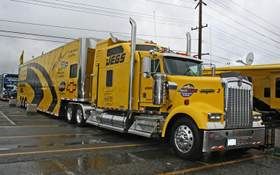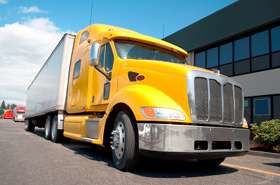The Right Company
Topic 10741 | Page 1

How To Choose A Company try that link.. Its going to boil down to what type of freight you want to haul,homtime and pay... Make a pros and cons list of every offer you got and pick one that suits freight, home time and pay...
OOS:
When a violation by either a driver or company is confirmed, an out-of-service order removes either the driver or the vehicle from the roadway until the violation is corrected.

I will never be able to get a hazmat because of a mistake I made 27yrs ago when I was 17.
Some companies require hazmat. I would suggest asking recruiters/companies that you are interested in if this will be an issue.
HAZMAT:
Hazardous Materials
Explosive, flammable, poisonous or otherwise potentially dangerous cargo. Large amounts of especially hazardous cargo are required to be placarded under HAZMAT regulations

I'm sure others with experience will chime in, but I'd say the decision of who to go with in this instance is really just a matter of deciding what things are most important to you, and then talking with all the companies you can about those things as well as any drivers you may be able to find who currently work for that company, and decide what fits your needs best. If regular home time is very important to you for instance, you would do well to look for a company that will hire you for a regional (home weekly) or local (home daily) driving position, rather than OTR. It might take a bit of searching to find the right company that fits you best, but I'm sure taking a bit of extra time to consider your options carefully now will pay off in the long run. Keep in mind whatever company you work for will probably want to try to stick with them for at least the next year, to make sure you have adequate driving experience under your belt before considering taking any new offers from other companies.
Regional:
Regional Route
Usually refers to a driver hauling freight within one particular region of the country. You might be in the "Southeast Regional Division" or "Midwest Regional". Regional route drivers often get home on the weekends which is one of the main appeals for this type of route.
OTR:
Over The Road
OTR driving normally means you'll be hauling freight to various customers throughout your company's hauling region. It often entails being gone from home for two to three weeks at a time.
HOS:
Hours Of Service
HOS refers to the logbook hours of service regulations.
The type of freight to haul depends on what you are looking for personally and what type of home life you have. to be honest most OTR jobs will eighter let you bring the truck home or in some rare instances will require you to live within a certain distance of a terminal ,but you aren't gonna be home much . regional drivers generally get more home time especially those on dedicated accounts but they generally must live close enough to park at a terminal altho there are some exceptions . as far as pay flatbed and tanker are your best paid then dedicated van . as far as your hazmat and your past contact the dmv because not all criminal convictions will stop you from getting a hazmat endorsement I'm enclosing a link that may shed some light on this subject for you . if you want to msg me directly my email is professional.70380@gmail.com http://www.cdldigest.com/cdl/hazmat_disqualifying_offenses.html
CDL:
Commercial Driver's License (CDL)
A CDL is required to drive any of the following vehicles:
- Any combination of vehicles with a gross combined weight rating (GCWR) of 26,001 or more pounds, providing the gross vehicle weight rating (GVWR) of the vehicle being towed is in excess of 10,000 pounds.
- Any single vehicle with a GVWR of 26,001 or more pounds, or any such vehicle towing another not in excess of 10,000 pounds.
- Any vehicle, regardless of size, designed to transport 16 or more persons, including the driver.
- Any vehicle required by federal regulations to be placarded while transporting hazardous materials.
HAZMAT:
Hazardous Materials
Explosive, flammable, poisonous or otherwise potentially dangerous cargo. Large amounts of especially hazardous cargo are required to be placarded under HAZMAT regulations
Terminal:
A facility where trucking companies operate out of, or their "home base" if you will. A lot of major companies have multiple terminals around the country which usually consist of the main office building, a drop lot for trailers, and sometimes a repair shop and wash facilities.
Regional:
Regional Route
Usually refers to a driver hauling freight within one particular region of the country. You might be in the "Southeast Regional Division" or "Midwest Regional". Regional route drivers often get home on the weekends which is one of the main appeals for this type of route.
OTR:
Over The Road
OTR driving normally means you'll be hauling freight to various customers throughout your company's hauling region. It often entails being gone from home for two to three weeks at a time.
Dm:
Dispatcher, Fleet Manager, Driver Manager
The primary person a driver communicates with at his/her company. A dispatcher can play many roles, depending on the company's structure. Dispatchers may assign freight, file requests for home time, relay messages between the driver and management, inform customer service of any delays, change appointment times, and report information to the load planners.DMV:
Department of Motor Vehicles, Bureau of Motor Vehicles
The state agency that handles everything related to your driver's licences, including testing, issuance, transfers, and revocation.
HOS:
Hours Of Service
HOS refers to the logbook hours of service regulations.Here are a few links to help you out:
Article Category "Choosing The Right Truck Driving Job"
Career Guide Chapter 5: Choosing Your First Trucking Company
Forum Topics Tagged "Choosing A Company"
Basically you'll want to decide how often you'd like to be home and what type of freight you'd like to pull. Once you figure out those two things it will narrow your choices dramatically. Then use pay, benefits, equipment, and any other preferences you may have to choose between the remaining candidates.
HOS:
Hours Of Service
HOS refers to the logbook hours of service regulations.OOS:
When a violation by either a driver or company is confirmed, an out-of-service order removes either the driver or the vehicle from the roadway until the violation is corrected.

Thanks for the advise guys. From that I compiled a list of pros and cons. From what I can tell food grade tanker, car hauling or flatbed fits me best. But it's hard to find tanker job for new drivers. Prime is the best pay and takes new grads, but I've read a lot about them really pushing a lease on you and people not getting enough miles to pay for it. I think they're a good company and it all depends on what I make of it. I would like to hear from some Prime driver, tanker or other. Looking long term my wife is going to join me on the road in a few years and we're going to either lease or buy a big sleeper berth truck. A big tractor creates its own set of challenges, like backing or tight turns, but I love challenges. So tanker or auto transport and flatbed seem like the best choices. This website is by far the best way to research info! I will appreciate any advice on my future greatfully.
Thanks a bunch
Sleeper Berth:
The portion of the tractor behind the seats which acts as the "living space" for the driver. It generally contains a bed (or bunk beds), cabinets, lights, temperature control knobs, and 12 volt plugs for power.

If I didn't go into the LTL sector running linehaul (pulling doubles), I was seriously considering Prime and Schneider for tanker, Crete / Shaffer for dry van / reefer. Your location will impact your choices, even for some truckload companies.
You can't go wrong with Prime or Schneider - they'll both take new drivers. Schneider is more chemical, Prime is strictly food grade. Don't pay attention to anybody saying that Prime pushes the lease - that's not what I've gathered from talking to Prime drivers myself. Granted, a lot of the tanker drivers for Prime are lease / ops, which I'm not sure why, but that doesn't mean that you can't be a company tanker driver for Prime. A lot of their tanker jobs are in the northeast / midwest. You don't have your location in your profile so I can't help you in regard to that. Schneider also determines their hiring base for tanker by location.
Once you get experience, you can go long haul tanker with a food grade like Indian River, but you might be happy to just stay with Prime, if you can get on with them as a tanker driver.
Also, don't underestimate the willingness of local tanker companies to hire you, if you don't mind pulling fuel. You didn't really say that you wanted OTR or more regional / local, but a lot of your opportunities will be based on your locations - as I keep saying. Location often trumps experience.
Regional:
Regional Route
Usually refers to a driver hauling freight within one particular region of the country. You might be in the "Southeast Regional Division" or "Midwest Regional". Regional route drivers often get home on the weekends which is one of the main appeals for this type of route.
LTL:
Less Than Truckload
Refers to carriers that make a lot of smaller pickups and deliveries for multiple customers as opposed to hauling one big load of freight for one customer. This type of hauling is normally done by companies with terminals scattered throughout the country where freight is sorted before being moved on to its destination.
LTL carriers include:
- FedEx Freight
- Con-way
- YRC Freight
- UPS
- Old Dominion
- Estes
- Yellow-Roadway
- ABF Freight
- R+L Carrier
OTR:
Over The Road
OTR driving normally means you'll be hauling freight to various customers throughout your company's hauling region. It often entails being gone from home for two to three weeks at a time.
Linehaul:
Linehaul drivers will normally run loads from terminal to terminal for LTL (Less than Truckload) companies.
LTL (Less Than Truckload) carriers will have Linehaul drivers and P&D drivers. The P&D drivers will deliver loads locally from the terminal and pick up loads returning them to the terminal. Linehaul drivers will then run truckloads from terminal to terminal.Doubles:
Refers to pulling two trailers at the same time, otherwise known as "pups" or "pup trailers" because they're only about 28 feet long. However there are some states that allow doubles that are each 48 feet in length.
Dry Van:
A trailer or truck that that requires no special attention, such as refrigeration, that hauls regular palletted, boxed, or floor-loaded freight. The most common type of trailer in trucking.Reefer:
A refrigerated trailer.
New Reply:
New! Check out our help videos for a better understanding of our forum features

















Preview:








 TT On Facebook
TT On Facebook
I just graduated APDA driving school in Mo. It was a great experience. I got a lot of wheel time and knowledge. Passed my Dot test 1st time! Now I've been bombarded with recruiters. How do you choose? I know I'll be a great employee but I wanna good employer. Should I choose a company that has a depot that's close to my home or that will let me take the truck home? Is that even important? I want good pay, benefits, and home time but everyone says that and all companies promise you that. I also don't know what freight to haul...I will never be able to get a hazmat because of a mistake I made 27yrs ago when I was 17. I hope someone can shed some light for me. Thanks brothers and sisters, Troy
HAZMAT:
Hazardous Materials
Explosive, flammable, poisonous or otherwise potentially dangerous cargo. Large amounts of especially hazardous cargo are required to be placarded under HAZMAT regulations
DOT:
Department Of Transportation
A department of the federal executive branch responsible for the national highways and for railroad and airline safety. It also manages Amtrak, the national railroad system, and the Coast Guard.
State and Federal DOT Officers are responsible for commercial vehicle enforcement. "The truck police" you could call them.
OOS:
When a violation by either a driver or company is confirmed, an out-of-service order removes either the driver or the vehicle from the roadway until the violation is corrected.